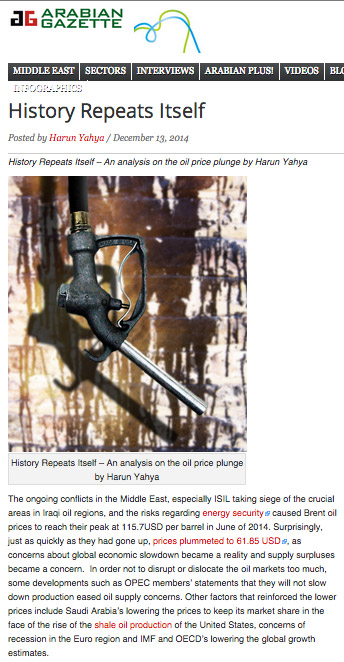 The ongoing conflicts in the Middle East, especially ISIL taking siege of the crucial areas in Iraqi oil regions, and the risks regarding energy security caused Brent oil prices to reach their peak at 115.7USD per barrel in June of 2014. Surprisingly, just as quickly as they had gone up, prices plummeted to 76.4 USD recently, as concerns about global economic slowdown became a reality and supply surpluses became a concern. In order not to disrupt or dislocate the oil markets too much, some developments such as OPEC members’ statements that they will not slow down production eased oil supply concerns. Other factors that reinforced the lower prices include Saudi Arabia’s lowering the prices to keep its market share in the face of the rise of the shale oil production of the United States, concerns of recession in the Euro region and IMF and OECD’s lowering the global growth estimates.
The ongoing conflicts in the Middle East, especially ISIL taking siege of the crucial areas in Iraqi oil regions, and the risks regarding energy security caused Brent oil prices to reach their peak at 115.7USD per barrel in June of 2014. Surprisingly, just as quickly as they had gone up, prices plummeted to 76.4 USD recently, as concerns about global economic slowdown became a reality and supply surpluses became a concern. In order not to disrupt or dislocate the oil markets too much, some developments such as OPEC members’ statements that they will not slow down production eased oil supply concerns. Other factors that reinforced the lower prices include Saudi Arabia’s lowering the prices to keep its market share in the face of the rise of the shale oil production of the United States, concerns of recession in the Euro region and IMF and OECD’s lowering the global growth estimates.The recent scenario is similar to 2009 when prices skyrocketed to 147 USD per barrel in July 2008, and then they fell two months later due to the global financial crisis. Recent plummeting prices are caused by shifts in both supply and demand. While there is a shrinkage in demand due to the slowing economies of the world, supply increases thanks to the United States is also a factor.
How does the plunge in oil prices affect oil-producing countries?
As oil prices have plummeted, oil-producing countries are bracing for an impending economic hit. Even though this decline is widening the budget gaps of OPEC members like Saudi Arabia, Bahrain, Oman, UAE, and Qatar; Saudi Arabia seems to be the one who is least affected. An advantage that a country like Saudi Arabia has is its cost-effective drilling methods and oil technology. This allows the Saudis to increase or lower prices via production levels almost at will. Also economically it can close its budget deficit caused by the drop in the prices with its reserve foreign currency. Despite receiving proposals from some other countries who also rely on oil revenues to cut down the production to allow the prices go higher, the Saudis continued their production at the same level as before. Feeling self-confident in terms of their country’s financial situation, Finance Minister Ibrahim Al-Assaf predicted Saudi growth rate could exceed 4 percent despite the decline in oil prices last week in his address in a press conference. He also added that even though any fall in oil prices would affect the fiscal income, they have the tools and potentials to cope with it.
How energy shapes the political events
It is a well-known fact that the energy sector helps shape political events in the world and when prices have been at their lowest level especially in last four years, there are many speculations regarding the causes rather than the ostensible economical factors. Since Russia is a competitor to Saudi Arabia in the energy sector and currently America’s arch-enemy, people speculate this plunge in price as a joint punishment for the Russian economy. Some conspiracy theories have attributed the recent 23% drop in the oil prices to a secret meeting between John Kerry and King Abdullah near the Red Sea in September of 2013. Michael Reagan, the son of former US President Ronald Reagan, is one of those adding to such theories by claiming a secret deal between his father and Saudi Arabia to drop the oil prices to end the Cold War for their benefit. He suggested to Obama to follow his father’s steps to defeat Russia by stating: “I suggest that President Obama might want to study how Ronald Reagan defeated the Soviet Union. He did it without firing a shot, as we know, but he had a super weapon - oil.” The Russian economy depends on energy for almost 45% of its GDP, and it makes it vulnerable to this price decline. Russia needs a price near $110 to balance its state budget. History once more repeats itself as Mikhail Gorbachev, former Soviet leader warned the world saying, "The world is on the brink of a new Cold War," Today, we are witnessing the devaluation of ruble due to plunging of the oil prices just like we did in the late 1980s that caused the bankruptcy of the Soviet Union.
New Realities and Global shift in energy and its consequences
Oil policy makers in the United States were worried about the country being energy dependent on external sources since World War 2. The painful memories of oil price shocks in the 1970s, which led to an economic recession has always been a concern. Today, the scenario is not the same and we see America being an energy independent state removing its vulnerability against the global oil price shifts. Given this situation, we will see a big geopolitical shift in terms of energy dependency as China replaces the US as the major energy consumer in the world.
America becoming a key players in the oil and gas sector will be affected by energy price shifts as oil and gas are a global commodity and if there is a rise in prices in one part of the world, other exporter countries will naturally follow. While the countries whose budgets are highly dependent on oil revenues are on alert and do their best to narrow down their budget gaps to have economic stability, its the oil consumers who are benefiting from this the most. Consequently, the world economy will emerge as a winner here as Tom Helbling of the IMF points out that a 10% change in the oil price is associated with around a 0.2% change in global GDP. This decline will eventually shift the resources from producers to consumers who are more prone to spend their gains. China as being the world’s second-largest oil importer will be gaining 60 bn dollars in its import spending if this decline is sustained.
Adnan Oktar's piece on Arabian Gazette:


